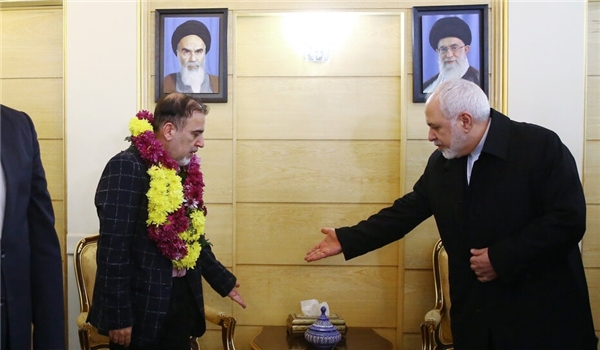Released Professor: US No. 1 Enemy of Iranian People
Prominent stem cell Professor Masoud Soleimani, who was imprisoned by the US government for 14 months, said that Washington is the number one enemy of the Iranian people, recounting that his American jailers had told him they did not care if his patients died while he was incarcerated.

Upon arrival at Tehran’s Mehrabad Airport, Iranian stem cell scientist Dr. Masoud Soleimani said that his jail wardens had told other prisoners that he was a terrorist with a mission to carry out bombings in the United States.
Recounting his ordeal at the hands of American jailers, Soleimani described the United States as “the number one enemy” of Iran and the Iranians.
Soleimani — who works in stem cell research, hematology and regenerative medicine — was on a sabbatical when he was arrested by US authorities upon arrival in Chicago a year ago and transferred to a prison in Atlanta, Georgia.
“US authorities in the jail had told prisoners that I was a terrorist who wanted to carry out bombings in America,” he told reporters upon arrival at Tehran’s Mehrabad airport on Saturday night.
“They had made such false statements so that other prisoners would not come close to me and keep away from me.
“After a while, the inmates would tell me, ‘you do not look like a terrorist and a bomber, what these guys are saying and I would tell them I don’t know what they are saying’,” he said.
“The Americans were so mean and low that when I told them that many patients were waiting for me to have their things done, they said, ‘let them die, it doesn’t matter’,” he said on Saturday.
“This shows their main problem is with the Iranian people. They are upset and angry about the scientific progress and the right path that Iran has taken, and we have a duty to continue this path so that the country can grow and prosper.”
Soleimani suffered from several health problems which aggravated during his incarceration.
According to American political analyst Scott Bennett, the Trump administration held the Iranian stem cell scientist hostage to gain leverage over the Islamic Republic through “diplomatic extortion.”
Professor Soleimani arrived at Tehran Mehrabad airport on Saturday evening after he was released by the US in a prisoner swap. He was welcomed by his family members and Iranian officials upon his arrival. Iranian Foreign Minister Mohammad Javad Zarif accompanied the released scientist from Zurich where the swap took place.
Soleimani had travelled to the US on October, 21, 2018 with a visa issued upon an invitation by the Mayo Clinic in Minnesota to lead a research program on the treatment of stroke patients.
He was, however, arrested by the FBI upon arrival at the Chicago airport. His visa was canceled and he was transferred to a jail in Atlanta, Georgia.
His family had several times voiced worries about Soleimani’s “poor” mental and physical condition in jail, saying he is suffering from chronic irritable bowel syndrome, has lost 15 kilograms and suffers from severe vision loss.
Soleimani’s family condemned the US government’s hostile act.
BJay Pak, the US attorney in Atlanta, secured Soleimani’s indictment on June 12, 2018, just a month after President Donald Trump withdrew the US from the Iran nuclear deal, and Soleimani had been fully unaware of such an indictment when he flew to the US.
Franco and Page Pate, another Atlanta lawyer, said that they had been puzzled by the federal government’s decision to prosecute a renowned Iranian professor and two of his former students – Mahboobe Ghaedi and Maryam Jazayeri – for purported trade sanction violations over eight vials of human growth hormone.
Franco said that Soleimani’s treatment by federal authorities, the revocation of his visa and the decision to detain him without bond doesn’t square with Soleimani’s international reputation as a scholar, professor, and doctor widely known in the field of stem cell research and regenerative medicine. Soleimani has no criminal history anywhere in the world, he added.
The hormone, which is a form of synthetic protein, was seized from Jazayeri in 2016 by customs authorities in Atlanta when she was heading to Iran to give it to professor Soleimani for research purposes. Jazayeri had received the hormone from Ghaedi.
The seizure occurred at a time when Washington was still a signatory to the 2015 nuclear deal, officially known as the Joint Comprehensive Plan of Action (JCPOA), and anti-Iran sanctions had not been re-imposed yet.
The growth hormone is not banned in the US or Iran and was being used “exclusively for medical research”, which is still considered largely exempt from US sanctions, Franco said.
However, Ghaedi and Jazayeri faced similar federal charges for attempting to supply Soleimani with the growth hormone.
Ghaedi is a permanent American resident and an assistant professor at Yale University’s School of Medicine. She is free on a $250,000 bond. Jazayeri is a naturalized US citizen and Kentucky resident and has conducted medical research at the University of Louisville. She is currently free on a $200,000 bond.
“I truly don’t understand it,” Franco said of the government’s decision to prosecute, adding that it appeared to be “some type of policy argument”. Pate, who represents Jazayeri, said his client was “completely confused by all this.”
Motions to dismiss the charges are pending in federal court in Atlanta in front of US District Judge Eleanor Ross. However, Federal prosecutors in Atlanta have not yet responded to the motions.
Hearing this case had been adjourned for at least three times since October and his family and Tarbiat Modares University had paid over $70,000 to his lawyers to prove his innocence, but all to no avail, said TMU’s Vice-chancellor for Research Affairs Yaghoub Fathollahi.
Fathollahi added that Soleimani is a distinguished professor who has been ranked among the top 1% scientists in the world.







